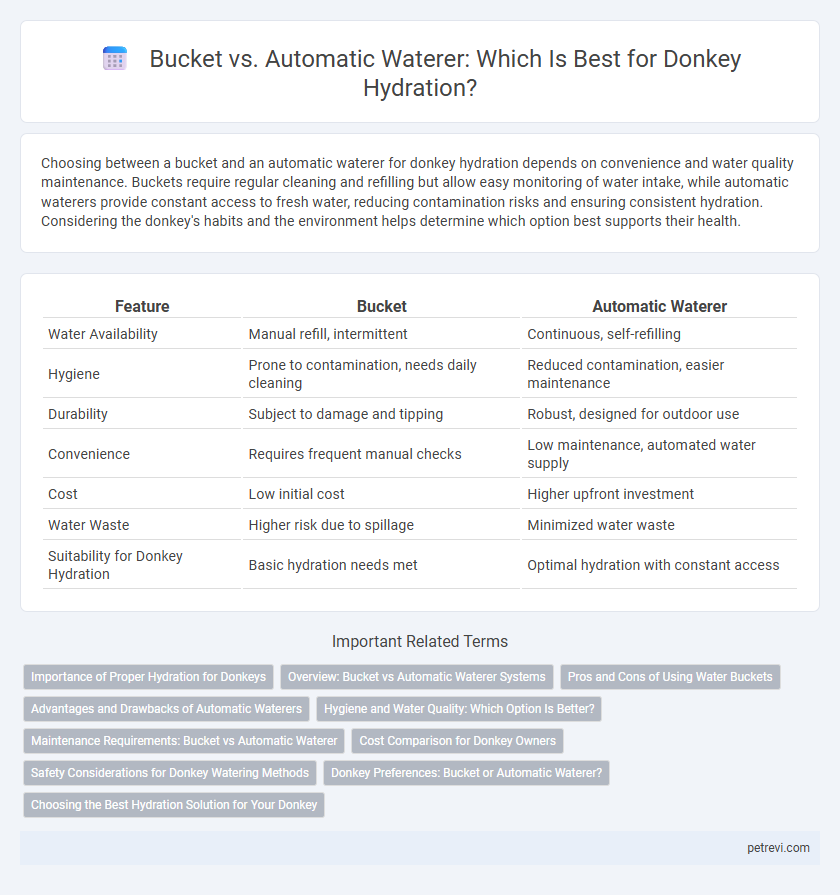Choosing between a bucket and an automatic waterer for donkey hydration depends on convenience and water quality maintenance. Buckets require regular cleaning and refilling but allow easy monitoring of water intake, while automatic waterers provide constant access to fresh water, reducing contamination risks and ensuring consistent hydration. Considering the donkey's habits and the environment helps determine which option best supports their health.
Table of Comparison
| Feature | Bucket | Automatic Waterer |
|---|---|---|
| Water Availability | Manual refill, intermittent | Continuous, self-refilling |
| Hygiene | Prone to contamination, needs daily cleaning | Reduced contamination, easier maintenance |
| Durability | Subject to damage and tipping | Robust, designed for outdoor use |
| Convenience | Requires frequent manual checks | Low maintenance, automated water supply |
| Cost | Low initial cost | Higher upfront investment |
| Water Waste | Higher risk due to spillage | Minimized water waste |
| Suitability for Donkey Hydration | Basic hydration needs met | Optimal hydration with constant access |
Importance of Proper Hydration for Donkeys
Proper hydration is crucial for donkeys to maintain optimal digestion, regulate body temperature, and support overall health. Buckets provide a simple, cost-effective water source but require frequent cleaning and refilling to prevent contamination and ensure freshness. Automatic waterers offer consistent access to clean water, reducing the risk of dehydration and promoting steady hydration essential for donkey welfare and performance.
Overview: Bucket vs Automatic Waterer Systems
Buckets provide a simple and cost-effective water source for donkeys but require frequent manual refilling and cleaning to ensure hygiene. Automatic waterer systems maintain consistent water availability using float valves to regulate flow, reducing labor and minimizing contamination risks. Choosing between these systems depends on factors such as herd size, maintenance capacity, and water quality management priorities.
Pros and Cons of Using Water Buckets
Water buckets offer simplicity and low cost for donkey hydration with easy portability and no power requirement. However, they require frequent manual refilling and cleaning, posing contamination risks and potential spillage that wastes water. Buckets may also encourage stagnant water if left too long, increasing the chance of bacterial growth and health issues in donkeys.
Advantages and Drawbacks of Automatic Waterers
Automatic waterers provide donkeys with constant access to fresh water, promoting consistent hydration and reducing labor for caretakers. They minimize water contamination by preventing dirt and debris from entering the water supply, but they can be costly to install and require regular maintenance to avoid malfunctions. Malfunctioning automatic waterers may result in water shortages, posing a risk of dehydration if not promptly addressed.
Hygiene and Water Quality: Which Option Is Better?
Buckets require frequent cleaning to prevent algae growth and bacterial contamination that can compromise a donkey's hydration quality. Automatic waterers offer continuous fresh water with reduced risk of stagnation and contamination but need regular maintenance to avoid mechanical failures and biofilm buildup. For optimal donkey hydration, an automatic waterer combined with diligent hygiene practices ensures superior water quality and health benefits.
Maintenance Requirements: Bucket vs Automatic Waterer
Buckets require frequent cleaning and manual refilling multiple times daily to ensure fresh water, posing higher maintenance demands. Automatic waterers have built-in filtration and regulated flow systems that reduce cleaning frequency and provide constant access to clean water. Despite higher initial setup costs, automatic waterers minimize labor and ensure consistent hydration for donkeys.
Cost Comparison for Donkey Owners
Buckets for donkey hydration offer a low upfront cost, typically ranging from $5 to $20, making them accessible for most donkey owners. Automatic waterers involve a higher initial investment, usually between $150 and $400, but they reduce labor and water waste over time, potentially lowering long-term expenses. Donkey owners must weigh the immediate affordability of buckets against the durability and convenience benefits of automatic waterers when considering overall cost efficiency.
Safety Considerations for Donkey Watering Methods
Buckets for donkey hydration allow control over water quality and quantity but pose risks such as contamination, spillage, and accidental ingestion of dirt. Automatic waterers reduce manual labor and ensure constant access to fresh water, yet require regular maintenance to prevent leaks, freezing, or malfunction that could deprive donkeys of hydration. Prioritizing safety involves selecting materials resistant to chewing, placing containers away from hazardous areas, and frequently inspecting water sources to maintain clean, accessible hydration.
Donkey Preferences: Bucket or Automatic Waterer?
Donkeys tend to prefer drinking from buckets due to the familiarity and ease of accessing still water, which better suits their natural hydration behaviors. Automatic waterers provide a constant supply but may deter some donkeys because of unfamiliar sounds or water movement. Understanding donkey preferences can improve hydration effectiveness and overall health by aligning water delivery methods with their behavioral tendencies.
Choosing the Best Hydration Solution for Your Donkey
Buckets provide a simple, cost-effective hydration method for donkeys but require frequent refilling and cleaning to ensure water quality and prevent stagnation. Automatic waterers offer consistent access to fresh water, reduce labor, and help maintain optimal hydration by supplying water on demand, which is essential for donkey health and vigilance against dehydration. Evaluating factors like herd size, available space, and budget helps determine whether a bucket or automatic waterer best supports your donkey's continuous hydration needs.
Bucket vs Automatic waterer for Donkey Hydration Infographic

 petrevi.com
petrevi.com